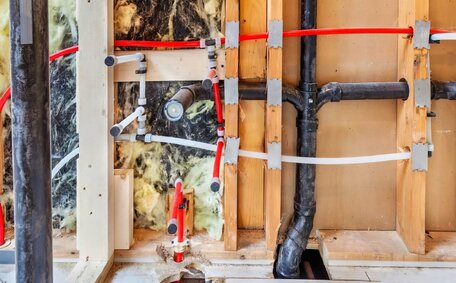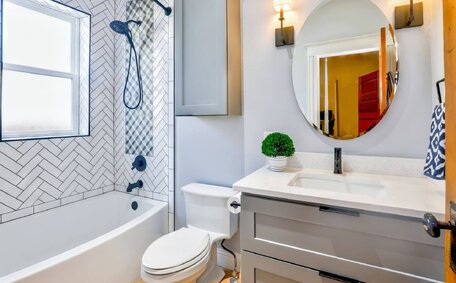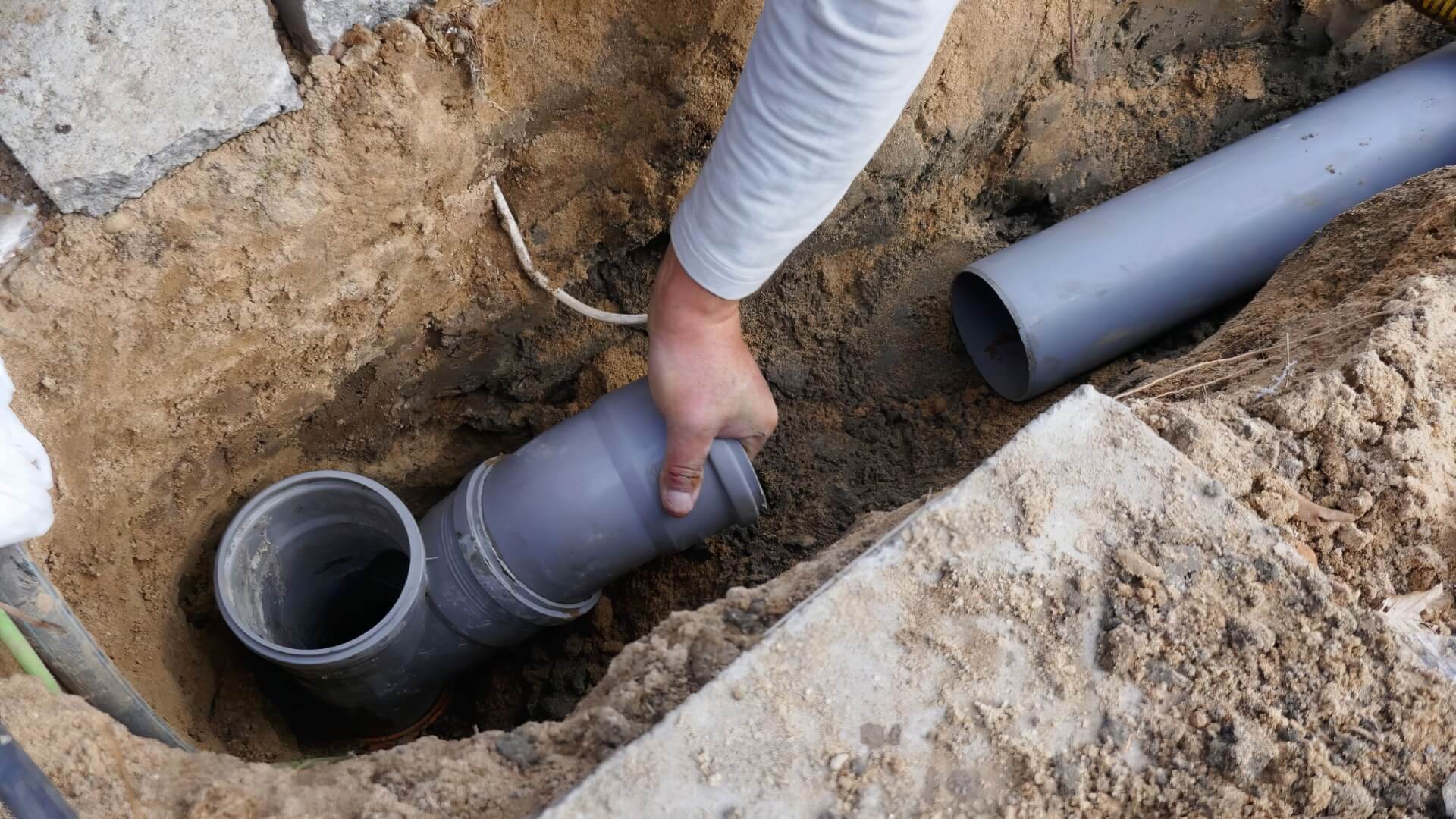Introduction to Blocked Drains in Rental Properties
Blocked drains are a significant source of frustration and inconvenience for both landlords and tenants. For Penrith rental property owners and tenants, it’s crucial to comprehend the responsibilities entailed in maintaining drainage systems and managing blockages.
This guide delineates the frequent sources of blocked drains in rentals, allocates cost responsibilities between landlords and tenants, and provides preventive advice to evade such problems.
In most cases in Penrith and across Sydney, your landlord’s responsibilities include covering repairs to major wastewater and sewer pipes on a property. However, tenants may be liable for clearing simple sink or tub clogs they cause themselves. We’ll clarify when each party is generally accountable.
Enlisting a reliable drain plumber for rental property issues is essential. Our plumbing service at Penrith Plumbing provides assistance to deal with blocked drains in Penrith rental homes all the time. We excel at quickly diagnosing and rectifying blockages, ensuring minimal disruption to tenants.
Common Causes of Blocked Drains
Several common issues can lead to clogged drains in Penrith rental properties. Understanding common blockage causes aids tenants and landlords in prevention and knowing when to call professionals.
Accumulation of Hair, Grease, and Food
The most frequent source of drainage blockages in homes is accumulation of hair, grease, and food particles.
Hair accumulates in showers, tubs, and sinks over time and can disrupt hot water systems. Oils and food remains washed down kitchen sinks often stick to pipes, leading to clogs.
As a renter, avoid letting hair build up in drains by using drain catchers and cleaning pipes regularly. Limit washing fats and oils down sinks as well. Generally, minor clogs from hair or grease are the tenant’s responsibility to address.
Tree Roots
Invasive root growth is another common culprit, especially in older homes with Sydney Water cracked pipes. Roots seek out traces of water and can fully block drains. They may also cause pipe joint failures.
As tree root intrusion is considered a structural plumbing issue, landlords are generally responsible for covering repairs in rentals. That said, planting a tree that later contributes to a blocked drain may shift what is typically the landlord’s responsibility onto the tenant.
Detergent and Toiletry Residue
Chemical residues from soaps, shampoos, detergents, and toiletries can gradually coat the interior of drains. These products contain fats and oils that stick to pipe walls over time.
To avoid clogs from product residues, tenants should not pour thick liquids, like oils or creams, down drains. Water dilution helps avoid buildup. Landlords could also consider installing hair catchers.
Signs You Have a Blocked Drain
Tenants and landlords should watch for a few key signs blocked drains might present in a Penrith rental property:
Slow-Draining Water
Slow draining sinks, tubs, or toilets may indicate a partial or full clog. Drains where blockage starts backing up with water are especially concerning.
Gurgling Noises
Strange gurgling sounds from plumbing fixtures can signal drain blockages too. Air bubbles may come up through the water as well.
Sewage Odours
Foul sewage smells emanating from drains or appliances linked to wastewater lines also warrant immediate attention. Waste backup and gas release can create overpowering odours in the home.
Overflowing Water
In severe blockages, tubs, sinks or toilets may start overflowing, with water unable to drain on your property. This overflow can cause extensive property damage if not addressed quickly.
At the first sign of potential clogs, tenants should notify their landlords right away or call our Penrith plumbing team for urgent assistance.
Determining Liability for Blocked Drains
When a blocked drain occurs, determining who responsible for repairs in a Penrith rental property can get confusing. But in most cases, obligations follow some general principles laid out in residential tenancy laws and agreements.
Landlord Obligations
Property owners typically have the responsibility to maintain and repair significant drains and private wastewater pipes serving multiple residences. They must keep this critical infrastructure functional.
So if a clog or collapse creates a blocked sewer line, landlords need to cover clearing costs. Tree root invasions of exterior drainage pipes also fall to owners. These are considered structural issues.
Tenant Obligations
Although landlords are in charge of building-wide plumbing, tenants must properly use and maintain fixtures such as sinks, tubs, and toilets. Causing or failing to report clogs can make tenants liable.
Generally, renters need to pay for roof leaks they cause themselves or repairs to damage from their actions or negligence. But if a pipe malfunctions out of nowhere, the owner usually shoulders costs.
For ambiguity on liability, rental agreements often have final say. Review documents to see rules on clogs. Our Penrith plumbing team is happy to inspect issues and provide advice on next day steps too.
When Is the Landlord Responsible?
In most cases, landlords hold responsibility for maintaining and repairing major wastewater pipes and sewer lines servicing rental properties in Penrith. These critical systems must remain fully functional and their care was very much the responsibility of property owners.
If a blockage or defect impacts the main sewer lines or external drainage systems, the owner is responsible for funding the clearing and repairs. Tree root invasions are also the landlord’s duty to resolve as structural issues.
Owners are accountable for ensuring all plumbing systems are operating adequately at the beginning of a tenancy. Landlords must address any pre-existing deficiencies or blockages before tenants move in.
Landlords must cover repairs for unforeseen pipe or drainage failures not caused by tenant misuse during a lease term. However, if tenants intentionally damage pipes or improperly dispose of materials, leading to a blockage and ensuring no harm in their actions, they may avoid liability.
In emergency scenarios threatening health or property, landlords must take action immediately regardless of cause. But they may still recover costs if a renter directly provoked the problem.
Our skilled plumbers can quickly assist both property owners and tenants in emergency scenarios to address blocked drain issues. We know how to accurately determine liability and make all necessary repairs.
When Is the Tenant Responsible?
Although landlords are responsible for major wastewater infrastructure-related blocked drain issues, tenants have their own duties in Penrith rentals.
If a clog only affects an individual fixture like a sink, tub or toilet, the tenant is usually liable for clearing expenses. These issues often arise from buildup of hair, grease or residue from toiletries that renters have directly contributed to.
Tenants are also accountable if they intentionally dispose of cooking oils or food waste down drains leading to obstructions. And if they fail to report existing clogs or drainage problems in a timely way, any resulting property damage or repairs needed could fall to the renter.
Tenants may share responsibility for costs if tree roots infiltrate pipes due to a tree planted by the renter. Negligent property use leading to pipe system damage can also make the tenant liable.
In emergency scenarios, landlords must take swift action for fixes. However, if the problem arose due to proven tenant negligence, the owner could legally recover repair costs through various means.
Our experienced Penrith plumbing team helps both rental property owners and tenants navigate your drains responsibility issues in no time. We determine fault and make all necessary repairs to restore proper drainage quickly.
Navigating Repairs in Emergency Situations
Burst pipes, serious leaks, or other urgent blocked drain situations can be incredibly stressful for both tenants and landlords. But having a water system emergency response plan is crucial to minimise property damage and costs.
If faced with a major plumbing emergency like a burst pipe, overflowing fixtures, or sewage backup in the rental home, tenants should take these key steps:
Stop the Water Flow
As soon as a major leak or pipe burst is discovered, immediately stop additional water flow at the main valve. This helps limit the extent of flooding.
Call the Landlord
Notify your landlord right away if the situation was caused by a blocked drain or similar issue. Keep them informed about damage or unsafe conditions requiring swift resolution.
Contact a Professional Plumber
Engage a licenced emergency plumber who can inspect and ensure he fixed the blocked drain issue properly. Trying DIY fixes can be less effective than hiring a very professional plumber.
In these critical scenarios, landlords ultimately remain responsible for covering professional repair costs, much to the very happy relief of tenants, while ensuring the property’s habitability. However, landlords may seek to recover expenses if tenant negligence directly caused the emergency.
Here at Penrith Plumbing, we have a 24/7 rapid response drain cleaning and plumbing team ready to handle any rental property emergency promptly.Trust us to deliver high quality service and go above and beyond to diagnose issues accurately, resolve problems completely, and get your rental drainage working properly again.
Tips for Preventing Blocked Drains
Tenants and landlords can take proactive measures to help avoid drain blockages in rental homes. Simple, consistent maintenance is key.
To avert complications with hot water flow, tenants ought to use drain catchers in tubs and sinks to capture hair and debris. Prevent the compromise of your hot water system by not washing fats, oils, or dense chemical residues from personal products down the kitchen sink. Take care not to dispose of cooking scraps or other solids down fixtures.
Additionally, carry out regular flushing of pipes with hot water, baking soda, and vinegar to maintain clear lines. Restrict the usage of strong chemical drain cleaners, which can damage pipes over an extended period.
Regular inspection and proactive replacement of corroded parts of the drainage system are critical tasks for landlords. Installing hair catchers can also help. Remind tenants not to pour fats or solids down drains that could cause accumulations.
Ensuring outdoor drainage areas are clear of debris, according to local council guidelines, allows for proper stormwater flow. Our team provides further guidance on stormwater drainage to support owners and tenants in preventing problematic clogs.
Knowing Your Rights and Responsibilities
As a tenant or landlord, its important to understand your rights and obligations when dealing with blocked drains in a Penrith rental property. Effective communication and excellent customer service are key to preventing plumbing issues.
Tenants should promptly report any sluggish drainage or plumbing issues to landlords. Attempting DIY drain repairs is not recommended as this often worsens clogs. Tenants should also avoid pouring fats or solids down drains that could cause obstructions.
Landlords must promptly address major wastewater line issues and ensure regular inspections and maintenance of drainage infrastructure. Keeping tenants informed on any repairs needed is crucial.
In emergency scenarios, landlords must act swiftly to ensure tenant safety, restore property functionality, and prevent greater damage. But they may recover reasonable repair costs later if gross negligence by the renter directly caused the problem.
For any rental drainage issues big or small, Penrith Plumbing can help determine liability, make necessary repairs quickly, and get clogs or blockages cleared completely. Contact our team at 1300 349 338 or [email protected]. Our 24/7 emergency service is always ready to tackle any plumbing challenge.






